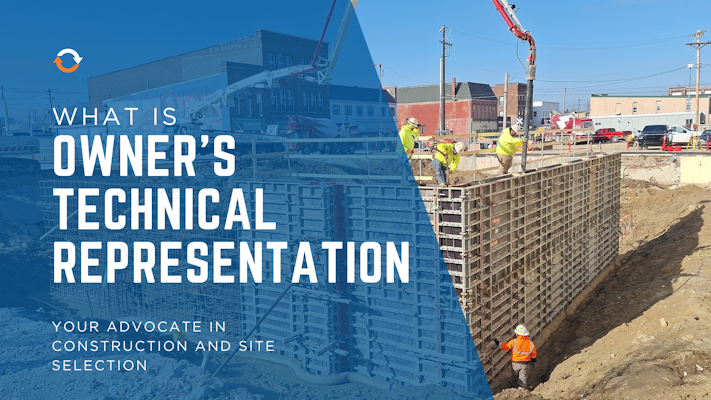
What is Owner's Technical Representation (OTR)?
Construction and development projects are high-stakes and complex. Whether public or private, they involve dozens of collaborators, tight schedules, technical decisions, and significant investment. For owners without a deep background in construction, navigating this process alone can lead to delays, costly mistakes, and misalignment with their original goals.
That’s where an Owner’s Technical Representative (OTR) comes in.
What Does an OTR Do?
An Owner’s Technical Representative (OTR) is an experienced construction professional hired to serve as the owner’s advocate throughout the entire project lifecycle. From early planning to project closeout, their primary role is to protect the owner’s best interests, especially when the owner lacks the internal resources needed to oversee the complexity of a ground-up project, renovation, or site selection process.
While every consultant and contractor on a project team brings their own expertise, an OTR is the only participant whose sole responsibility is to represent the owner’s goals, vision, and investment. They work collaboratively with architects, engineers, contractors, and vendors, but remain independent and focused solely on executing the owner’s objectives.
The OTR manages each player in the process including architects, contractors, developers, and consultants, so they’re brought in at the right time, working toward the same outcome with clear accountability.
There are several risks in any construction or development process that a client should consider. Many of these risks aren’t immediately obvious to the owner without an advocate who understands where those risks lie and how to mitigate them. These projects can quickly veer off course. Scope creep, budget overruns, unclear communication, and conflicting collaborator interests can cause owners to lose confidence in the process, the team, and even their own decisions.
An OTR brings structure, clarity, and accountability to the process, helping owners navigate uncertainty with informed, timely decisions that protect the project’s overall success.
Even the most experienced owners face challenges during construction, such as:
- Budget overruns
- Schedule delays
- Scope changes that reduce long-term value
- Conflicting priorities among project partners
An OTR helps eliminate these issues by bringing structure, transparency, and strategic oversight to every phase of development.
Key Responsibilities of an OTR
An Owner’s Technical Representative serves as a strategic advisor throughout the entire project lifecycle, providing oversight, technical insight, and clear communication to keep projects on track.
They review design documents to warrant alignment with the owner’s goals, monitor budgets and schedules, and identify risks early to avoid costly delays. They also manage scope changes, ensure contract compliance, and translate technical information into clear, actionable updates for the owner.
Most importantly, an OTR represents the owner's best interest in every meeting and milestone. This bridges the gap between technical teams and strategic decisions to ensure the project delivers lasting value years after the project is complete.
Benefits of an OTR
1. Minimizes Costly Mistakes and Rework
Construction errors are expensive. An OTR reviews plans, identifies red flags early, and ensures alignment across the team—preventing rework and change orders down the road.
2. Ensures Transparency and Alignment
An OTR keeps your goals front and center, bridges communication gaps, and ensures you always know where your project stands—and why decisions are being made.
3. Keeps Projects on Schedule and Within Budget
They actively monitor progress and troubleshoot issues early, helping you avoid delays and unexpected costs.
4. Reduces Risk and Contractual Missteps
OTRs make sure contracts are understood and followed, reducing disputes and keeping the project on track.
5. Supports Smarter, Faster Decisions
They provide the technical context behind big decisions so owners can act quickly—and confidently.
6. Provides Peace of Mind
You don’t need to be a construction expert. With an OTR, you have someone you trust watching every detail and advocating for your best outcome.
An OTR is more than a project manager; they’re a strategic partner who ensures your vision is executed with integrity, accountability, and expertise during every step of the process.
Learn more about our process and how we guide you and your project every step of the way here.